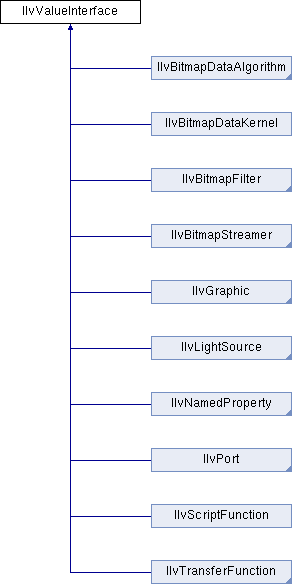 |
Rogue Wave Views Foundation Package API Reference Guide |
Rogue Wave Views Documentation Home |
 |
Rogue Wave Views Foundation Package API Reference Guide |
Rogue Wave Views Documentation Home |
Value interface class. More...
#include <ilviews\intrface\value.h>

Public Member Functions | |
| virtual IlBoolean | applyValue (const IlvValue &value) |
| Apply an accessor. More... | |
| virtual IlBoolean | changeValue (const IlvValue &val) |
| Changes the value of an accessor. More... | |
| virtual IlBoolean | changeValues (const IlvValue *values, IlUShort count=0) |
| Changes several accessor values simultaneously. More... | |
| virtual void | getAccessors (const IlSymbol *const **names, const IlvValueTypeClass *const **types, IlUInt &count) const |
| Retrieves the list of available accessors of an object. More... | |
| virtual const char * | getName () const |
Returns the name of the instance. The semantic and implementation of this method are defined by concrete subclasses. The default implementation returns 0. More... | |
| virtual IlvValue & | queryValue (IlvValue &val) const |
| Retrieves an accessor value. More... | |
| virtual void | queryValues (IlvValue *values, IlUShort count) const |
| Retrieves multiple accessor values simultaneously. More... | |
Value interface class.
Library: xviews or winviews or mviews (mutually exclusive)
IlvValueInterface is an abstract class defining the programming interface for subclasses wishing to expose their properties and methods through a generic and uniform mechanism similar to introspection.
An application can manipulate an instance of IlvValueInterface, or more precisely an instance of a subclass, by using its methods queryValue() and changeValue(), and without explicit knowledge of the concrete subclass.
Although applications seldom need this feature directly, it is extremely useful when defining a binding between Views libraries and a scripting language. The IlvValueInterface mechanism then becomes the invisible layer by which the scripting language is able to manipulate C++ objects.
Many predefined classes derive from IlvValueInterface, in particular IlvGraphic, IlvView, IlvGadgetItem, IlvManager, and of course all their subclasses.
IlvValueInterface implementation is based on the class IlvValue, which is basically a triplet [ name, type, value ] and a set of operators.
In order to expose a property, a subclass of IlvValueInterface defines an accessor. An accessor can be seen as an association between a name, a type identifier, and a data member with functions to get and set this data member value.
To define new accessors, a subclass must override the method getAccessors() and declare a name and a type for each accessor. The name must be unique.
Then, the subclass must override queryValue() if the subclass allows to get the data members values, and applyValue() if it allows to set these values.
This class defines the following accessors:
| Name | Type | Equivalent methods |
|---|---|---|
name | String | getName() |
IlvValue. Apply an accessor.
This member function is called by changeValue() and changeValues() methods. It must not be called directly.
This method must be overriden by subclasses wishing to add a new accessor modifiable by changeValue().
| value | The new value of the accessor. |
IlTrue on success, otherwise IlFalse. Reimplemented in IlvSystemPort, IlvScriptFunction, IlvGraphicInstance, and IlvGraphicCOMAdapter.
Changes the value of an accessor.
The changeValue() method can be used in the following way:
| val | The new value of the accessor. |
IlTrue if the accessor value is changed successfuly. IlvValue.
|
virtual |
Changes several accessor values simultaneously.
This method iterates through the array values and calls applyValue() for each of them.
It can be used in the following way:
| values | The array of new values. |
| count | The number of item in the array. |
IlTrue if all calls to applyValue() return IlTrue. Otherwise, it returns IlFalse. IlvValue.
|
virtual |
Retrieves the list of available accessors of an object.
Retrieves the list of accessors of an object. names is the resulting array of symbols. Each symbol is the name of an accessor. types is the array of the types of accessors, count is the number of accessors. The existing types for accessors are the following:
IlvValueBooleanType IlvValueIntType IlvValueUIntType IlvValueFloatType IlvValueDoubleType IlvValueStringType IlvValueDirectionType IlvValueColorType IlvValueFontType IlvValuePatternType IlvValueColorPatternType IlvValueGradientPatternType IlvValueLineStyleType IlvValueFillStyleType IlvValueFillRuleType IlvValueArcModeType IlvValueBitmapType IlvValueStringArrayType IlvValueUIntArrayType IlvValueMenuItemArrayType IlvValueMatrixItemArrayType IlvValueNotebookPageArrayType The possible accessors for an object are described in the corresponding class.
| names | The array of symbols returned by the method. Each symbol is the name of an accessor. |
| types | The array of types returned by the method. Each value is the type of an accessor. |
| count | The number of items in the arrays names and types. |
Reimplemented in IlvGraphic, IlvGraphicCOMAdapter, and IlvGraphicHandle.
|
virtual |
Returns the name of the instance. The semantic and implementation of this method are defined by concrete subclasses. The default implementation returns 0.
Reimplemented in IlvBitmap, IlvGraphic, IlvView, IlvBitmapFilter, IlvBitmapStreamer, and IlvNamedProperty.
Retrieves an accessor value.
The queryValue() method can be used in the following way:
This method must be overriden by subclasses wishing to add a new readable accessor.
| val | The IlvValue used both to identify the accessor and to store the return value. |
IlvValue. Reimplemented in IlvScriptFunction, IlvGraphicInstance, and IlvGraphicCOMAdapter.
Retrieves multiple accessor values simultaneously.
All the accessor values are returned in the array.
The method iterates through the array values and calls queryValue() for each of them.
The queryValues() method can be used in the following way:
| values | An array of IlvValue used both to identify the accessors and to store their return values. |
| count | The number of items in the array. |
IlvValue. © Copyright 2017, Rogue Wave Software, Inc. All Rights Reserved.
Rogue Wave is a registered trademark of Rogue Wave Software, Inc. in the United States and other countries. All other trademarks are the property of their respective owners.